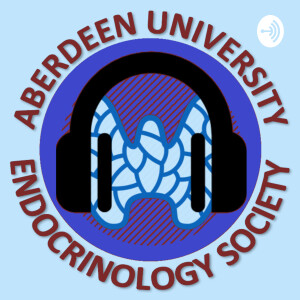
Hello and welcome back to EndoPod! We are finally back with our episode for this academic year. In this episode we are covering a condition experienced by some women called Polycystic Ovary Syndrome. We are going to discuss what it is, the physiology related to it, the people at risk, causes, as well as treatment and management associated with this condition. Sit back and enjoy! Transcript- Lewis Mitchell Voice- Lewis Mitchell Disclaimer – Aberdeen University Endocrinology Society is a student lead organisation and the content provided through EndoPod is solely for informative purposes. This does not replace the advice of a doctor or any other healthcare professional. The medical students involved in the making of this episode are in the 3rd year of their medical studies. All the information provided in this episode was researched on appropriate resources – to view them, please check the episode description. REFERENCES:
· https://www.nhs.uk/conditions/polycystic-ovary-syndrome-pcos/
· https://www.nichd.nih.gov/health/topics/pcos/conditioninfo
· https://www.nichd.nih.gov/health/topics/pcos/conditioninfo/diagnose
· https://medlineplus.gov/polycysticovarysyndrome.html
· https://www.aafp.org/afp/2016/0715/p106.html
· https://www.healthline.com/health/polycystic-ovary-disease#symptoms
· https://www.ncbi.nlm.nih.gov/pmc/articles/PMC6676075/
· https://bmcmedicine.biomedcentral.com/articles/10.1186/s12916-020-01516-x#:~:text=PCOS%20cannot%20be%20diagnosed%20during,beyond%203%20years%20post%20menarche.
· https://www.ncbi.nlm.nih.gov/pmc/articles/PMC2861983/
· https://www.ncbi.nlm.nih.gov/pmc/articles/PMC3872139/
More Episodes
 2021-11-07
2021-11-07
 2021-11-07
2021-11-07
 2021-10-10
2021-10-10
 2021-05-02
2021-05-02
 2021-04-18
2021-04-18
 2021-03-15
2021-03-15
 2021-03-15
2021-03-15
 2021-03-15
2021-03-15
 2021-03-15
2021-03-15
 2021-03-15
2021-03-15
 2021-03-15
2021-03-15
 2021-03-15
2021-03-15
 2021-03-15
2021-03-15
 2021-03-15
2021-03-15
 2021-03-08
2021-03-08
 2021-03-08
2021-03-08
 2021-03-08
2021-03-08
 2021-03-08
2021-03-08
 2021-03-08
2021-03-08
Create your
podcast in
minutes
- Full-featured podcast site
- Unlimited storage and bandwidth
- Comprehensive podcast stats
- Distribute to Apple Podcasts, Spotify, and more
- Make money with your podcast
It is Free
- Privacy Policy
- Cookie Policy
- Terms of Use
- Consent Preferences
- Copyright © 2015-2024 Podbean.com






